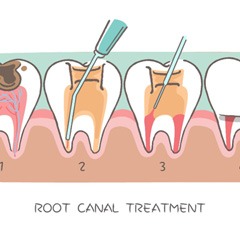Root Canal Therapy – Sunnyvale, TX
Tooth Pain Relief Through Restoration
Has one of your teeth been hurting for a while now, and the pain seems to be getting more intense? Does simply having a sip of hot coffee or iced tea feel agonizing? In either case, it would seem you are dealing with an infection inside the dental pulp – the bundle of nerve endings located at the center of your tooth. Since this area is so sensitive, it can cause discomfort to the degree that it interferes with your daily life. Hope is not lost, however, because here at the office of Dr. George Philip , we want nothing more than to relieve your tooth pain through restoration and give you a reason to smile once again. Contact us so we can get you back on track with root canal therapy in Sunnyvale!
Do I Need Root Canal Therapy?

The most common indication of the need for a root canal is a severe, persistent toothache. However, that is certainly not the only symptom to look for. Other signs you might need a root canal include:
- Extreme, prolonged sensitivity to hot or cold foods or beverages
- Sharp pain when biting down
- Dark discoloration of a tooth
- Swelling or redness of the gums surrounding a tooth
- A pimple-like bump on the gums near a tooth
As soon as you notice any of these symptoms, let us know. We’ll get you in for an emergency appointment ASAP.
The Root Canal Process

The term “root canal” gets a bad rap, but this procedure is actually painless. In fact, by removing the infected nerve of the tooth, a root canal is designed to relieve pain. Plus, your emergency dentist in Sunnyvale will numb your mouth with a local anesthetic beforehand so you will remain comfortable throughout the process. If needed, Dr. Philip can also utilize nitrous oxide sedation during the procedure.
He will begin by using special instruments to access the inner chambers of the tooth and remove the pulp that’s triggering your pain. After sanitizing the area, he’ll refill it with a synthetic gutta-percha material to retain the tooth’s shape. The next step is to seal and protect the tooth by placing a temporary dental crown. As your mouth heals, the area around the tooth might feel a bit sore and tender.
A few weeks later, we will see you back at our dental office. Then, Dr. Philip will switch out your temporary crown for a permanent one. At that point, the underlying tooth should be fully protected. You’ll be able to use it as you normally would – bring on that cup of coffee!
The Benefits of Getting a Root Canal

While replacement options like dental implants definitely have their benefits for your smile, preserving your natural tooth should always be the primary goal. If you hesitate to get a root canal when you need one, the infection might progress to the point of no return and your tooth will have to be extracted entirely. Removing and replacing a tooth is a much more complex, time-consuming, and wallet-draining venture than root canal therapy.
In addition to saving your natural tooth, root canal therapy has other benefits:
- Virtually pain-free procedure – Thanks to the advanced dental technology we use, getting a root canal is about as comfortable as the process for an ordinary filling.
- High success rate – The vast majority of root canal patients retain their treated tooth for decades, if not the rest of their lives.
- Aesthetically pleasing results – After your root canal, your tooth will be restored with a custom-made dental crown that seamlessly blends in with the rest of your smile.
Understanding the Cost of Root Canals

At this point, you may really want to get a root canal. The treatment could, after all, potentially save your tooth! Still, maybe you’re worried about the expenses involved. A procedure won’t help if getting it would “break the bank.” The truth, however, is that the cost of root canal therapy varies by patient. As such, you’d need to consult Philip for an exact estimate. Whatever the final price, though, you can trust our office to help you navigate the financial details. To learn more, just keep reading or call us.
Factors That Can Affect Root Canal Cost

Dr. Philip can only learn your root canal’s cost after giving you an oral exam. This assessment, you see, would let him examine the factors impacting treatment expenses. The most common of these are:
- Your Tooth's Type - As teeth can have differing numbers of root canals, therapy’s price partly depends on a tooth’s type.
- Treatment Difficulty - If the affected tooth is highly damaged, treating it will become difficult. Naturally, that raised difficulty will translate to higher costs.
- Need for Additional Services - If you follow root canal therapy with a crown placement, treatment will get pricier.
Is it Cheaper to Pull My Tooth?

Ultimately, tooth extraction does have a lower upfront price. It’s thus pretty easy to choose it over root canal therapy. That said, the former option has more downsides overall than the latter one.
Remember: There are long-term consequences to losing a natural tooth. Left unchecked, the newly-made smile gap will tilt your other teeth and attract harmful oral bacteria. You’d then face heightened dental pain and a crooked, dirty grin.
Fortunately, root canal therapy avoids these problems. It saves the affected tooth and thus prevents future dental and orthodontic issues. Plus, the procedure lets you forego costly tooth extraction and replacement treatments.
Does Dental Insurance Cover Root Canal Therapy?

Because root canal therapy counts as a major procedure, most dental plans cover it. More specifically, many will extend coverage to about 50-80% of the treatment’s cost. (Of course, this fact assumes you’ve met your yearly deductible.)
On the other hand, remember that every plan is different. Your own might not help with root canal therapy. As such, confirm your insurance benefits before pursuing care. Our office can help you do so if necessary.
Other Options for Making Root Canal Therapy Affordable

Thankfully, ways besides insurance exist to make root canals affordable. Many dental practices, in fact, have options to help patients reduce their expenses.
Consider our team at Dr. Philip’s office, for example. We happen to offer flexible financing via CareCredit. Through them, you can pay for a root canal in monthly, low-interest installments. You’d then be able to manage the cost gradually instead of all at once.
Ultimately, you can trust Dr. Philip to give you affordable root canals. So, book a consultation with us to get more financial facts and settle your treatment!
Root Canal FAQs

If your dentist in Sunnyvale tells you that you need a root canal, it’s completely normal to feel nervous about the procedure. After all, you’ve probably heard multiple unpleasant rumors about the procedure. While it may sound daunting, it’s actually not as bad as you may think! Most patients claim it’s no more uncomfortable than a standard filling. At our practice, we believe being well-informed can help ease any nerves you might have, which is why we’ve decided to answer some frequently asked questions below.
How Long Does It Take to Recover from a Root Canal?
Most patients are able to return to work or school the day after their root canal. Of course, the recovery time is different for everyone. If your job requires physical labor, you should take at least two to three days off, mainly because vigorous exercise can delay the healing process by diverting blood from the site. You can promote faster recovery by taking over-the-counter pain medication as directed, sticking to a soft-food diet, and diligently following aftercare instructions.
Can I Eat Before a Root Canal?
Patients receiving dental sedation for their root canal may be asked to fast for a few hours beforehand. It’ll help lower the risk of nausea caused by the sedative. However, those who won’t be undergoing sedation are encouraged to eat a healthy meal before treatment. Since your mouth will feel numb afterward, you’ll have difficulty eating until the effects fade away. Make sure you avoid alcohol for at least 24 hours beforehand as it could negatively interact with the local anesthetic used to numb your mouth.
Do I Need Antibiotics Before or After My Root Canal?
Generally, it’s not necessary to take antibiotics before or after getting a root canal. The only time you’ll be prescribed antibiotics beforehand is if you have a health condition that increases your risk of developing an infection after a major dental procedure. Rest assured – your dentist will review your medical history during your consultation to determine whether or not you need to be prescribed antibiotics.
Can Root Canals Be Prevented?
One of the best ways to prevent root canals is by taking proper care of your teeth and gums. Brushing twice a day, flossing daily, rinsing with an ADA-approved, and visiting your dentist regularly are healthy practices that’ll help minimize the risk of bacteria reaching a tooth’s pulp. Some other ways to prevent root canals include drinking plenty of water, maintaining a healthy diet, and wearing a protective mouthguard to protect against oral injuries.

